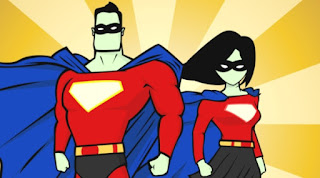Superheroes, Week 1 Notes
A big thanks to all those who turned out Wednesday night. Here's a synopsis of some of my speaking notes from our discussion. Please feel free to make comments on this post and I will get back to you, or just bring further thoughts and questions next Wednesday!
It's hard not to notice that superhero stories and movies have never been more popular. Since 2000, there have been many blockbusters released each year — most of which have raked it it at the Box Office. In 2012 alone, the top two films of the year were superhero stories. The Avengers, which made more than $600,000 in the United States and more than $1.5 billion worldwide became the third highest grossing film of all time.
Clearly these stories are resonating with people. That's because superhero stories have become the mythology for our American culture. The Greek and Roman culture had myths in the form of Gods. Aesop had his fables. Grimm had his fairytales. We have comic books. And they serve largely the same purpose — especially in film form where we have used these films to consider larger issues affecting the fabric of our society, government, and culture.
And it's not just in movies where these things are taking place, it's on our weekly TV experiences too. For the first week, we looked at the ideology of "Heroes," a popular show that aired for four seasons on NBC beginning in 2006.
Movies and TV are cultural art forms — though when you see some of them it's hard to remember that. And, like all art forms, the content of the message reflects the thoughts and values of the creator. In the case of "Heroes," that's Tim Kring.
Donald Miller, a Christian author and thinker, said "Narrative has an unbelievable ability to adjust your moral compass." A lot of times that happens when you don't even realize it. The blueprint for the ideology behind the premise of "Heroes" is evident in the pilot.
In looking at a couple early clips, it becomes clear that the focus of the show is on science, humanity, and human potential. That doesn't leave a lot of room for God. Some might call this an atheistic approach — but I think that’s an over simplification of where our culture has branched off. Atheism is simply the belief there is no God. Kring might fall into that category, but that doesn’t explain the approach of “Heroes” from a worldview standpoint.
We know that, as Christians, we derive our purpose from the Lord. Proverbs 16:9 says, “In his heart a man plans his course, but the Lord determines his steps.” The Lord guides out path. But what else to we get from the Lord? How about our hope? David said in Psalm 71:5 “For you have been my hope, Sovereign Lord, my confidence since my youth.” God, giving us purpose and guiding our steps, gives us hope. Jesus’ sacrifice on the cross gives us hope — even in dark times. But if you didn’t rely on that, where would your hope come from?
So if you are an Atheist, and you don’t believe in God, or you are a Secular Deist, who believes in a God outside the box — a God who made the world but left it and humanity to run on their own — you would be left with two paths. Either there is no hope and all is meaningless — which leads you to a Nihlistic worldview — or we have to be capable of creating our own hope — which leads to a Humanistic worldview. Humanists emphasize the value and agency of human beings. We can create our own morality, shape the world, and be agents of change.
This is not a new worldview. While I know that it is popular among Conservative Christians to say that our Founding Fathers were all Christians, historical evidence doesn’t bear that out. Consider Thomas Jefferson: he believed in the idea of God, but a God outside the box. He re-wrote the Bible for himself removing any reference to the divinity of Jesus Christ or the miraculous. He believed Jesus was a wise and moral teacher. He saw hope in the idea that humans were capable of shaping the world and creating a purpose for the world.
That, too, I think is what we see in the ideology of “Heroes.” Consider the show starts out with those deeper life questions and quickly jumps to an exploration of the untapped potential of human beings.
So, we know that "Heroes" isn't presenting a Christian worldview, so should we dismiss it? No. One of the topics we discussed was the idea that superhero stories present both positive and negative ideas when it comes to our world view, and "Heroes" is no exception. It's basic premise might be flawed, but that doesn't mean it doesn't have something positive to offer our thinking.
One of the central challenges in the show surrounds the idea of how we make the world a better place. The underlying message is the idea that we all need to use out gifts and abilities to help those in need, to stand up for what's right and to make the world a better place.
You couldn't find a better tie-in to the justice series we're looking at now. Micah 6:8 says, “He has shown you, O mortal, what is good. And what does the Lord require of you? To act justly and to love mercy and to walk humbly with your God.” We may be coming from a different place and hold different beliefs, but I think as Christians we can agree with the idea that we should use the gifts and talents God has given us to battle injustice and make the world a better place.
See you next week when we consider the ideology and lessons of "Spider-Man!"




Comments
Post a Comment